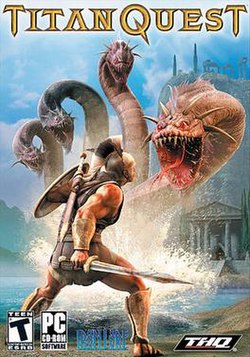Titan Quest
| Titan Quest | |
|---|---|
 |
|
| Developer(s) | Iron Lore Entertainment |
| Publisher(s) | THQ |
| Producer(s) | Jeff Goodsill |
| Designer(s) | Brian Sullivan |
| Programmer(s) | Max McGuire |
| Artist(s) | Michael Sheidow Rich Sullivan Josh McHugh |
| Writer(s) | Randall Wallace |
| Composer(s) | Scott Morton Michael Verrette |
| Engine | PathEngine |
| Platform(s) | Microsoft Windows, iOS, Android |
| Release date(s) |
Microsoft Windows
|
| Genre(s) | Action role-playing, hack and slash |
| Mode(s) | Single-player, multiplayer |
| Aggregate score | |
|---|---|
| Aggregator | Score |
| Metacritic | 77/100 (51 reviews) |
| Review scores | |
| Publication | Score |
| 1UP.com | B– |
| Eurogamer | 7/10 |
| GameSpot | 7.6/10 |
| GameSpy | |
| IGN | 8.1/10 |
| PALGN | 9/10 |
| PC Zone | 8.1/10 |
| VideoGamer.com | 8/10 |
| Touch Arcade | |
| Gamezebo | |
Microsoft Windows
June 26, 2006 (original release)
August 31, 2016 (Anniversary Edition)
Titan Quest is an action role playing hack and slash video game developed by Iron Lore Entertainment for Microsoft Windows personal computers. It was published by THQ in 2006. It was released on Steam in 2007, and later ported to mobile devices by DotEmu and released in 2016: later versions were published by THQ Nordic. The story follows a player-created protagonist as they navigate Ancient Greece, Egypt and China on a quest to defeat the Titans after they escape from their ancient prison. The gameplay is similar to the Diablo series, with player navigation being handled with a mouse-driven tile-based interface, and gameplay revolving around role-playing mechanics and real-time combat. An expansion, Titan Quest: Immortal Throne, was released in 2007.
Titan Quest was envisioned by game designer Brian Sullivan as a role-playing game set in Ancient Greece similar to Age of Empires. Production began in 2004 after a successful pitch to THQ. The script was written by Randall Wallace, while Sullivan acted as the designer. Despite being in a mythical setting, the team wanted to make the environments and towns feel as realistic as possible, leading to a large amount of research into ancient cultures. Enemies were inspired by the game's regional mythologies, with designs inspired by the stop-motion work of Ray Harryhausen. The music, composed by Scott Morton and Michael Verrette, was created to avoid the looping tracks of other games.
...
Wikipedia
